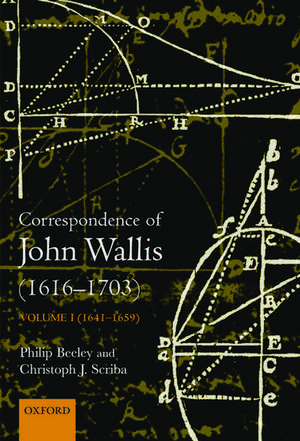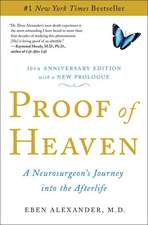The Correspondence of John Wallis (1616-1703): Volume II (1660 - September 1668): The Correspondence of John Wallis 1616-1703, cartea 2
Autor Philip Beeley, Christoph Scribaen Limba Engleză Hardback – 12 ian 2005
Preț: 1475.68 lei
Preț vechi: 2972.80 lei
-50% Nou
Puncte Express: 2214
Preț estimativ în valută:
282.38€ • 295.56$ • 235.02£
282.38€ • 295.56$ • 235.02£
Carte tipărită la comandă
Livrare economică 19-25 martie
Preluare comenzi: 021 569.72.76
Specificații
ISBN-13: 9780198566014
ISBN-10: 0198566018
Pagini: 722
Ilustrații: numerous halftones
Dimensiuni: 164 x 241 x 42 mm
Greutate: 1.36 kg
Editura: OUP OXFORD
Colecția OUP Oxford
Seria The Correspondence of John Wallis 1616-1703
Locul publicării:Oxford, United Kingdom
ISBN-10: 0198566018
Pagini: 722
Ilustrații: numerous halftones
Dimensiuni: 164 x 241 x 42 mm
Greutate: 1.36 kg
Editura: OUP OXFORD
Colecția OUP Oxford
Seria The Correspondence of John Wallis 1616-1703
Locul publicării:Oxford, United Kingdom
Recenzii
This is a first rate edition and a major scholarly accomplishment. The Correspondence of John Wallis is a trove for the historian of seventeenth century social and scientific life ... This edition is a must for every library and for every scholar whose interests touch upon the seventeenth century.
Review from following volumes A major work of scholarly editing.
Review from following volumes When completed, this edition of the correspondence will be an essential reference for anyone interested in the intellectual history of the period.
Review from following volumes Reading these letters enriches our understanding of the intellectual and academic community of the day. One can only welcome a publication that makes primary sources readily available to scholars and students alike. The meticulous care with which these volumes have been produced deserves considerable praise.
Review from following volumes A major work of scholarly editing.
Review from following volumes When completed, this edition of the correspondence will be an essential reference for anyone interested in the intellectual history of the period.
Review from following volumes Reading these letters enriches our understanding of the intellectual and academic community of the day. One can only welcome a publication that makes primary sources readily available to scholars and students alike. The meticulous care with which these volumes have been produced deserves considerable praise.









